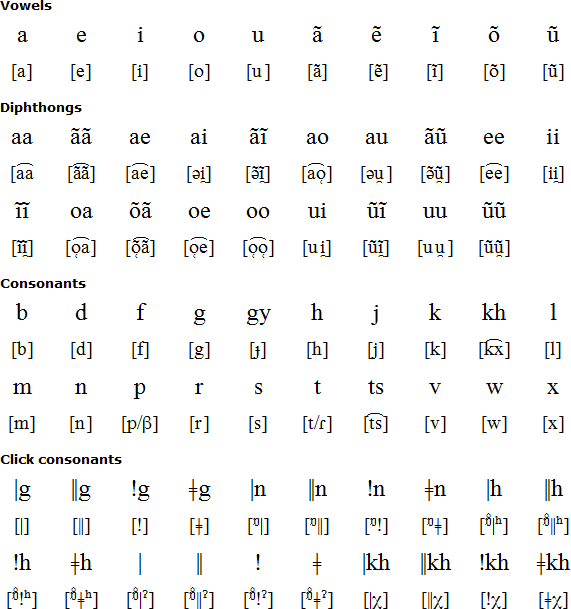Khoekhoe is a Khoe languages spoken mainly in Namibia, and also in South Africa, Botswana and by the Nama (Khoekhoen), Damar and Haiǁom peoples. The language is also known as Nama, and used to be known as Hottentot, although this name is now considered pejorative. In 2018 there were about 279,000 speakers of Khoekhoe in Namibia, mainly in the Erongo, Kunene, and Otjozondjupa regions in the south of the country.
There were about 2,000 speakers of Khoekhoe in western South Africa in 2013, mainly in Northern Cape province, and there were about 200 Khoekhoe speakers in the Ghanzi District in western Botswana in 2003.
Khoekhoe is a national language in Nambia, and is used in education at all levels, as well as on the radio. There are also Khoekhoe radio programmes in South Africa.
In the past the term Hottentot was used to refer to the Khoekhoe language and those who spoke it. This name was coined by early Dutch settlers, who, upon hearing the language spoken, thought that all the natives were saying was 'hot' and 'tot'. It is now considered pejorative and is no longer used.
The first European to study the Khoekhoe language was Georg Friedricj Wreede (c. 1635-1672), who arrived in Cape Town in 1659. He was governor of Dutch Mauritius and worked for the Dutch East India Company. He was also a student of Philology, and compiled a list of phrases in Khoekhoe, written in the Greek alphabet, with Dutch translations.

Download alphabet charts for Khoekhoe in PDF or Excel format.
ǂKam ǃũi-aob gye ǁẽib di gūna ǃhomi ǃna gye ǃũi hã i. ǀGui tsēb gye ǃgare-ǀuiï di ǃkhareï ei heiï di somi ǃna gye ǂnõa i, tsĩb gye ǁom tsĩ sĩgurase gye ǃgan-tana, tanaba ra ǃhororose. Ob gye ǁẽib ǁgūse gyere ǃũ beiraba ǃũi-aob ta ǃkamsa ǁgoa bi, ti gye ǂẽi. ǁNatib gye ǂnirase gye ǂhomisen, tsĩb gye ǁhei-ǂnu ei bi nĩse ǃgũṅ tsĩ ǀnĩ dā-ǃharoroti gose gye ǂgai-ǃoa-ǃoasen, tsĩb gye ǃũi-aob ei ǁhei-ǂnũ tsĩ ǁkhōse gye ǃkhā bi.
Ob gye ǃũi-aoba ǁkhōse ǂkon ǂoms ãba xu ǂkei-ǂkeihe, tsĩ gye ǁgao tsĩb gye ǁeixa hãse uri-khài tsĩ beiraba gye ǃkhō, tsĩ ǁnāba gye ǀgūse mã i tsouï ǃna gye ǀnami-ǁna bi. Xawe ǁnāsan nĩ nou gūna mũ, timis ǀkan gye beiraba sau tsĩ tsoub ǃna gye uri-ǁgõa tsĩ ǀkhom-ǀkhomsase ǃgaregu ei gye ǂku. ǁNatib gye ǃũi-aoba ǃgawua-ǃna hãse ǀũn ãba ra tsuru-!ã gye ǂgei. "ǂKawa ǁeiba xu ǂgosen tama īs gye ǂkhõas tsĩ ǀam-ǂgōsens tsĩna ra ū-hā."
One day a young shepherd was watching his sheep on a mountainside. While he was sitting on a rock in the shade of a tree, his head nodded forward and fell asleep. A ram grazing nearby, seeing the shepherd lower his head, thought he was threatening to fight. So he got ready, and drawing himself back a few paces he launched himself at the shepherd and butted him severely.
The shepherd, thus rudely awakened from his sleep, arose angrily, caught the ram, and threw him into a well standing nearby. But the moment the other sheep saw their leader fall into the well, they followed him in and were dashed to pieces on the rocks. So the shepherd, tearing his hair, cried out: "What sorrow and trouble are brought about by useless anger!"
Information about Khoekhoe | Phrases | Numbers | Tower of Babel
Information about the Khoekhoe (Nama) language
http://en.wikipedia.org/wiki/Khoekhoe_language
https://www.ethnologue.com/language/naq
Information about the Khoekhoe People
http://www.namibian.org/travel/namibia/population/nama.htm
http://www.mnsu.edu/emuseum/cultural/oldworld/africa/namaculture.html
Languages written with the Latin alphabet
Page last modified: 07.08.24
[top]
You can support this site by Buying Me A Coffee, and if you like what you see on this page, you can use the buttons below to share it with people you know.

If you like this site and find it useful, you can support it by making a donation via PayPal or Patreon, or by contributing in other ways. Omniglot is how I make my living.
Note: all links on this site to Amazon.com, Amazon.co.uk
and Amazon.fr
are affiliate links. This means I earn a commission if you click on any of them and buy something. So by clicking on these links you can help to support this site.
[top]